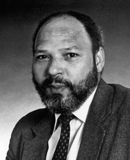
Todd Kreidler on the show’s genesis
Todd Kreidler, August Wilson’s collaborator on the script of How I Learned What I Learned, began his friendship with Wilson as his assistant on the world premiere of King Hedley II in 1999. Kreidler went on to direct many productions of How I Learned with Wilson starring, as well as other actors after Wilson’s death in 2005. Kreidler’s director’s note for a 2017 production at Round House Theatre offers insights into what it was like to work with a legend.
Profile of How I Learned What I Learned at Round House Theatre
This interview with Todd Kreidler and actor Eugene Lee during the show’s 2017 production offers more insights into the play’s history and legacy.
August Wilson’s Blues Poetry
This 2015 Humanities article by Michael Eric Dyson explores the language of Wilson’s plays and its connection to the blues. “If the blues is the wash of black suffering,” Dyson writes, ”hung up to dry in the sun of pitiless self-reflection, then August Wilson was our greatest lyrical washerman. He was also the most gifted blues poet on the American stage. He bathed the soil of bigotry in the rhetoric of black spirituality. And he made raucous black vernacular an agitator to stir hope into motion.”
“The highest form of literature”
In this Poetry Foundation conversation with Chuck Smith, curator of a 2015 Chicago festival celebrating August Wilson’s work, author Ruth Graham says, “Wilson began his writing career as a poet, and his first work for the stage, Black Bart and the Sacred Hills, was based on an original poem cycle. He found much greater fame and success in the theater…. Still, he called poetry ‘the highest form of literature.’”

Paris Review Interview with August Wilson
“August Wilson: The Art of Theater No. 14” is an extensive, wide-ranging 1999 interview with Wilson in conversation with Bonnie Lyons and George Plimpton of the Paris Review. In one small slice of this very rich conversation, Wilson says, “Once I learned to value and respect my characters, I could really hear them. I let them start talking. The important thing is not to censor them. What they are talking about may not seem to have anything to do with what you as a writer are writing about, but it does.”